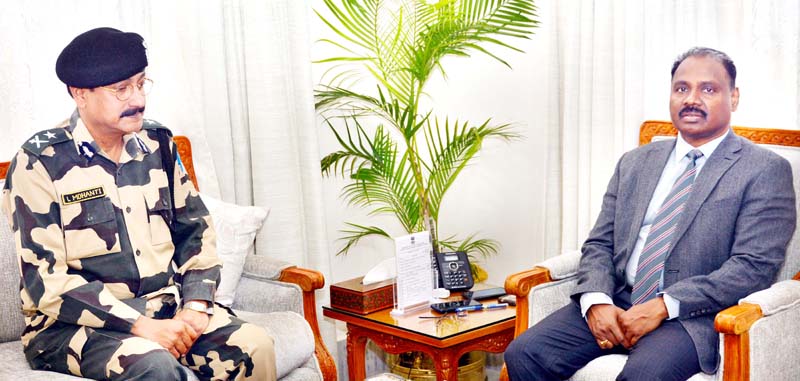
Govt to enhance manpower, install tech solutions
Centre assures full help to curb intrusions
Sanjeev Pargal
JAMMU, Feb 19: A five-member team of the BSF from Force Headquarters New Delhi deputed to Jammu by the Union Ministry of Home Affairs (MHA) and BSF today held high-level review of situation prevailing along the International Border (IB) with Lieutenant Governor Girish Chandra Murmu and Advisor Rajiv Rai Bhatnagar. The team has decided to enhance and redeploy manpower on the IB in Jammu to check infiltration attempts and menace of sniping, Unmanned Aerial Vehicles (UAVs) and drones.
IG (Operations) BSF Force Headquarters New Delhi, Lalat Indu Mohanti, who was heading 5-member high level team of the BSF from New Delhi to Jammu, told the Excelsior after meeting with Murmu, Bhatnagar and two days visit to the International Border that the BSF has decided to enhance and redeploy the manpower on the IB in entire Jammu sector to check the intrusion bids by the militants from Pakistan.
Mohanti gave detailed briefing to the Lieutenant Governor and Advisor Bhatnagar, who partly holds charge of the Home Department, in separate meetings and briefed them on the steps being taken by the BSF to completely seal the entire 198 kilometres long International Border in Jammu and install sophisticated equipments to check the incidents of sniper firing by Pakistan and surveillance by the UAVs and drones.
The top BSF officer also apprised Murmu that BSF was taking all possible measures to ensure that the militants don’t manage to sneak into Jammu from the International Border for disruptive activities.
“We have decided to enhance and redeploy manpower all along the International Border in Jammu sector especially in the vulnerable areas to plug the gaps, if any, and block the infiltration attempts by the militants from Pakistan,” Mohanti said, adding the BSF will be creating three-tier protection along the IB to ensure that even if the militants manage to break first two tiers they are trapped at the third and eliminated.
He said the Union Ministry of Home Affairs has promised full help to the BSF to seal the border and install new technological solutions along the International Border in Jammu.
Sources said the Force Headquarters IG from New Delhi apprised the Lieutenant Governor and the Advisor about new solutions which the Ministry of Home Affairs and the BSF have proposed for the International Border in Jammu sector.
“Apart from enhancement and redeployment of the BSF along vulnerable spots on the International Border, the BSF also proposed to install new technological solutions to counter anti-sniping incidents from Pakistan and check the misuse of UAVs and drones from across,” sources said, adding that latest technological solutions are being purchased from different countries as well as within India.
The new technological solutions will be in place soon.
However, the anti-tunnelling equipments are not available even with Israel and some other nations and the tunnels, if any, dug on the International Border by the Pakistani Rangers, would have to be detected manually.
On January 31 this year, police and para-military personnel had gunned down three militants at Ban Toll Plaza in Nagrota on Jammu-Srinagar National Highway. Three handlers of the slain militants, who were transporting them in a truck from Hiranagar to South Kashmir, had disclosed that the militants had infiltrated from the International Border between Dayala Chak and Hiranagar.
The handlers had later also revealed that they had shifted another group of three militants to Kashmir 40 days back and that those militants too had intruded from the same route.
In September 2018, security forces had gunned down three militants at Jhajjar Kotli on Jammu-Srinagar National Highway who too were being taken in a truck from Kathua to Kashmir. The handlers of these militants had also revealed that the group of militants had entered into Hiranagar from the same route.
Sources said the BSF team from New Delhi examined various possible spots which might have been exploited by the Pakistani Rangers and militants for infiltration but were told that fencing was intact at all the places the next day when the militants were reported to have infiltrated.
“This has led to the theory that the militants might have been using an underground tunnel for infiltration. However, during manual checking, no tunnel could be detected on the International Border,” sources said.

